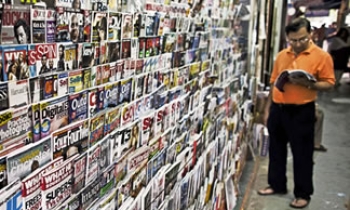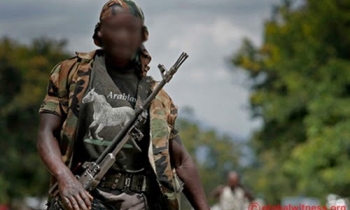The Western media have the right to show images that can potentially cause uproar, political turmoil or insult religious groups, argues Roger Koeppel, editor-in-chief of the center-right German paper Die Welt.
Koeppel's remarks were made during a debate entitled "Is free expression sacred?" to commemorate UNESCO's World Press Freedom Day 2006, which honors "the media as a force for change" and for the "crucial role a free press plays in strengthening democracies" around the world.
"We have the right to blasphemy. I deeply respect if a Muslim government wants to ban blasphemous cartoons, but it is essential to protect freedom of expression because of all the pain we have invested to keep our liberal, secular society," said Mr. Koeppel.
Koeppel, whose life was threatened for making the decision to republish the cartoons in Germany last February, also added that "we have the right to impose our views in our own countries."
When questioned whether he would publish "Mein Kampf" (a book written by former Nazi leader, Adolf Hitler), Koeppel said "of course not. Every society has the right to their own taboos."
In Germany, it is against the law to publish the book.
In the Muslim world it is considered taboo to make caricatures of the Prophet Mohammad.
Disrespectful views
The High Commissioner for Pakistan, Dr. Maleeha Lodhi, a former journalist, dismissed Koeppel´s views as disrespectful.
"Diversity implies you cannot rebuild the world in your image. You must respect the differences," Lodhi said.
"There is a tendency from the West to say 'We insult our own so we can insult yours too.' Well, no. We do have a problem and we demand respect."
Lodhi said freedom of speech must be bound by "decency, taste and context."
Abdul-Rehmen Malik, editor of the London-based Muslim magazine Q-news, added: "Europe needs to recognize its tortured relationship with minorities and others. Minorities are a reality and we better deal with it."
Malik criticized the idea of a "liberal intelligentia" and said, "We are passed defending the sacredness of secularity, which on its own is a paradox."
Dr. Ibrahim Seaga Shaw, editor of Sierra Leone-Expo Times, added that although he believed in freedom of expression, being an exiled journalist himself,
all professionals should have rules and regulations."
Peter Tatchell, a gay and human rights activist, said "We must find a balance between freedom of expression while protecting the vulnerable communities and countries." He added, "We need to draw the line when there is violence and defamation."
Steve Hermann, editor of BBC news Interactive, also noted that in the end is the responsibility of the journalists, and not of politicians and the law to determine the limits of freedom of expression.
"Journalists and editors need to judge the context, the timing, the general atmosphere," he said.
The U.N. General Assembly in 1993 proclaimed May 3 World Press Freedom Day and it has been observed since.









